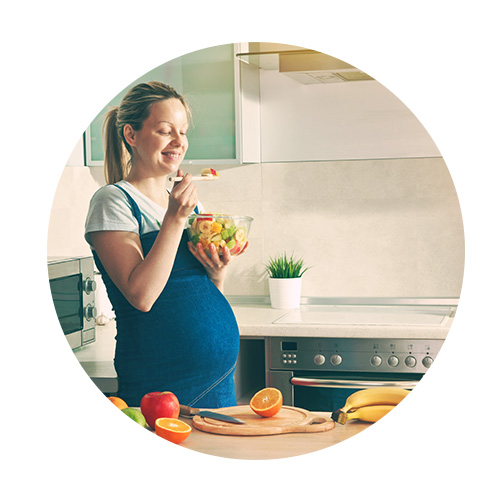
According to a recent study, fruit and vegetables consumption is associated with a lower risk of pre-eclampsia during pregnancy. To know more about these results, discover our food, health and sustainability watch.

A recent review assessed the effectiveness of cooking classes offered at school on culinary skills, knowledge and vegetable consumption in children aged 4 to 12. Among the 21 studies included in this work, a meta-analysis reported a positive effect of such interventions on culinary skills and vegetable consumption. These effects appear to be even greater when school programs include more than 6 hours of cooking. These findings underline the value of raising awareness on nutrition from an early age. However, further work is needed to measure the effects of similar interventions on children’s eating patterns and behaviours.

Evidence suggests that COVID-19 infection may have effects on post-infection mental health. One study assessed the association between adherence to the Nordic diet and these psychological symptoms. The dietary intakes and psychological parameters of 246 adults were collected and analysed. According to this work, whole-grain and fruit consumption, sleep quality and tuber consumption were associated with a reduction in depression, anxiety and stress scores. Thus, this study suggests that adhering to the Nordic diet may reduce psychological post-infection symptoms of COVID-19.

A recent study assessed the link between diet and quality of life among underprivileged children and adolescents in Greece. A total of 6503 beneficiaries of the Greek food aid program Diatrofi were included in this work. Quality of life was determined using the Pediatric Quality of Life Inventory questionnaire, and diet via a food frequency questionnaire. The results show that healthy eating habits, in particular fruit, vegetables and cheese consumption, are positively associated with quality of life and physical and emotional function in vulnerable children and adolescents. Conversely, the consumption of starchy foods and sweetened beverages is negatively associated with these parameters. The authors underline the need to provide precarious households with healthy food to improve their quality of life and, consequently, their health.

A recent study compared 2 Italian case studies concerning food waste in school canteens and its nutritional, economic and environmental impacts. To this end, the leftovers of children from 4 elementary school in the provinces of Parma and Lucca were collected. The results reveal that fruit and side dishes are wasted by over 50% in both provinces. Dietary fibre, folates, vitamin C, calcium and potassium are the nutrients for which losses are the highest. As for environmental impact, leftovers contribute to an average of 23.5% of the carbon footprint associated with meals, with starchy foods being the biggest contributor. Finally, the average cost of food waste can reach 4% to 10% of the total meal cost, depending on the region. This study underlines the need of reorganizing school canteens services to limit food waste and its consequences.

The MADRES prospective cohort study examined the associations between dietary habits and potential hypertensive disorders during pregnancy. The study included 451 low-income Latin American pregnant women living in Los Angeles. Dietary data were collected using 2 24-hour dietary recalls during the 3rd trimester of pregnancy. The prevalence of hypertensive disorders was extrapolated using medical records or determined during prenatal visits. The results show that a diet rich in saturated fats, refined cereals and cheeses is associated with an increased risk of preeclampsia during pregnancy. Conversely, a diet based on fruits, vegetables and oils is associated with a lower risk. These associations are even more pronounced in overweight women.




